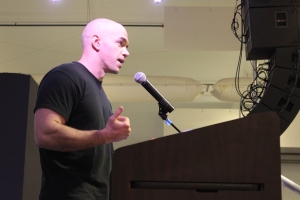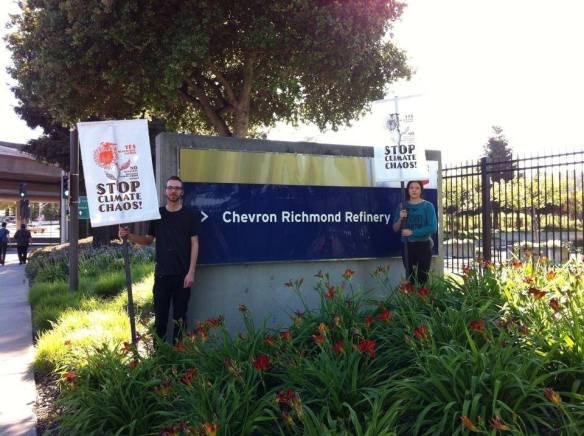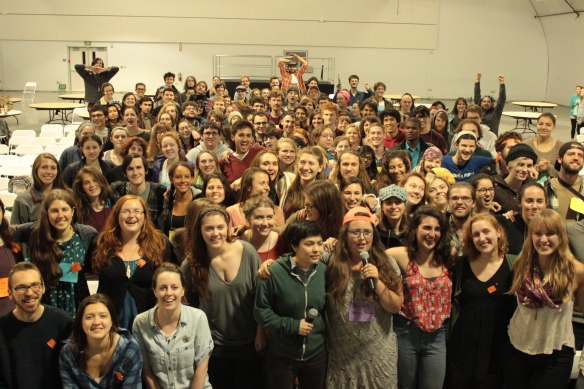 Reflecting on the Fossil Fuel Divestment Convergence 2014 and the Political Responsibility of Universities Invested in Oil, Coal and Gas Companies.
Reflecting on the Fossil Fuel Divestment Convergence 2014 and the Political Responsibility of Universities Invested in Oil, Coal and Gas Companies.
“The endowment fund is not a political tool. It is not a statement” said countless university administrators to students’ divestment campaigns, give or take a few words.
But how is the practice of supporting and sustaining companies that buy out the democratic processes of governments not political?
Shawn, a student from Maine, started off Friday evening’s opening plenary session with this question. He built on this topic by sharing the stories from his hometown of Portland and how pipeline expansion has affected the health, safety and political freedom in his community.
In his community, oil giants spent over $7,000,000 on buying votes to ensure local residents would not get in the way of exporting tar sands bitumen to international markets, despite the risks those developments would pose.
***
The Fossil Fuel Divestment Convergence 2014 held at San Francisco State University (SFSU) from April 4-6, confronted issues like the above. I was one of five Divest Dalhousie campaigners to attend; a campaign asking Dalhousie University to freeze new investments in fossil fuel companies, divestiture over four years, and higher transparency of its endowment fund investments. Through acknowledgement and deep exploration of interconnected issues, it offered constructive framework on what we, concerned students, alumni, and community members, can do to change the relationships that coal, oil and gas companies have with our institutions.
The opening night featured speeches from many inspiring individuals working towards environmental and social justice, including Tim DeChristopher. My knowledge of DeChristopher’s work prior to the conference was based on stories from my peers, all extremely impressed and inspired by his progressive tactics, to say the least.
DeChristopher didn’t go into much detail on his past experiences in working towards environmental justice, which include getting arrested for disrupting and shutting down an illegally held land auction, as well as spending two years in prison as a result of this. Instead, he focused on building a strong argument for why inaction on climate change is unacceptable.
The power and emotion of DeChristopher’s stage presence immediately brought me back to the mindset of why I was at the convergence. It can be difficult to stay focused on climate and environmental justice while living amidst a culture that prioritizes the individual over the community, and while doing so fails to acknowledge the complete dependence it has on its natural foundation. This should not be an excuse for apathy, when DeChristopher voiced the question, “How could you?” in reference to the way that generations before us have treated the environment and each other. I was strongly reminded that we were all here to build the movement for climate justice, as well as a clearer idea of what this means.
when DeChristopher voiced the question, “How could you?” in reference to the way that generations before us have treated the environment and each other. I was strongly reminded that we were all here to build the movement for climate justice, as well as a clearer idea of what this means.
***
The first workshop I attended was titled Divestment as a Solidarity Tactic, and was structured more like an open panel. It featured five experts on divestment, including fossil fuel divestment, prison divestment, South African apartheid divestment and two individuals working on Israeli apartheid divestment campaigns.
I decided on this workshop/panel over other options because any campaign that aims to take away the social license of a rogue industry – like fossil fuels – won’t work unless it is intricately connected to other campaigns and movements.
The views and experiences around divestment that this panel offered really highlighted how divestment is changing a national narrative around many issues, such as the morals around privately owned prisons. Marcel Jones (UC Prison Divestment) spoke to this and the necessity of prison abolishment, pointing out that prisons profit and sustain themselves by turning people into a commodity.
Towards the end, Saliem Shehadeh (UC Davis, Student for Justice in Palestine) brought up the importance of being mindful of the community who wants to counteract your campaign. Acknowledging that the primary goal of fossil fuel companies is to maximize profit at all costs means that divestment campaigns have to be one step ahead of them. If that means they are in bed with someone of political authority, you need to get in bed with someone else of political authority, was how Shedaheh put it. Or use other effective tactics like public shaming – basically any way you can neutralize the other community, do it.
This workshop was very informative, however I was hoping it would go into more depth on fossil fuels and their direct and indirect role in starting/fueling conflict and war. This topic was touched on a little bit by both South African and Israeli apartheid divestment campaign representatives, but the overall focus was more on domestic socio-political issues within the United States and the potential divestment has in transforming these.
***
The next workshop I took part in was titled Climate Justice: Decolonizing Lands, Minds and Institutions, facilitated by Peaceful Uprising National Organizer Henia Belalia.
Belalia began the workshop by recognizing that we were on unceded Indigenous land. If climate justice is the aim of a wider movement, it will not work unless we tackle it from the root, and this always means knowing the history of a space you are in and honoring that. Overlapping systems of oppression that have gone unquestioned by dominant societal narratives for hundreds of years become more visible, as does their interconnectedness and underpinnings.
Next, we explored what the role of an activist should and should not be. In trying to make a more just world, we shouldn’t be going into other communities and ‘activating’ people.
Regardless of the intention, this attitude of an individual ‘empowering’ another only reinforces these power structures that the climate justice movement aims to deconstruct.
In order to get nearer to the root causes of power imbalance, it is crucial that we first acknowledge and reflect on our position in the world. This requires we first educate ourselves on the historical and presently existing systemic forces responsible for bringing us to where we are today, the major ones being patriarchy, colonialism, capitalism and white supremacy.
Colonialism and capitalism operate by erasing people’s traditions and cultures. The immediate response of many who come to understand these issues is to speak and act on behalf of these marginalized communities, without taking the time to listen to their story or even ask if this representation is something they want. This can be counter-productive and often harmful. We need to be elevating the voices of marginalized communities, and cannot do so without first having some understanding of our personal positionality in the world and making the commitment to start and sustain dialogues with these communities so they can be the ones making the decision on what is best for them.
Another really important thing that this workshop addressed was the urgency aspect of confronting climate change. Sea level rise, increasing desertification and higher frequency of extreme storms all call for urgent action, but this should not compromise how we go about attempting to solve these issues. There is no way that we can take long-term approaches to climate change mitigation without taking the time to reflect on the reality that all of these problems are the result of a dominant system founded on colonization. From this recognition we can begin actively working to decolonize our internal and external realities.
***
Those first two workshops were a lot to take in, and weeks later I’m still reflecting on them. I really appreciate how honest and real each facilitator and panelist was, and hope to have an opportunity to learn more from them sooner than later. I’m unable to come up with a fitting transition, so I’ll just go into what happened next…
***
After eating lunch in a tree with friends Rylie and Levi in the warm, sunny California climate, I sat in on a panel titled Strengthening Administrative Engagement. Definitely not the most immediately captivating topic, but it was important for me to attend this, as some members of the Dalhousie University administration have recently been stonewalling our campaigners’ outreach to them.
San Francisco State University (SFSU) is a unique case where the university has agreed to partially divest its endowment from fossil fuel companies, and only took campaigners three months to achieve this commitment. After talking to some students on the SFSU divestment campaign, it became clear that the admin were currently more focused on ‘talking the talk’ than ‘walking the walk’, so to speak, meaning they had so far put more time and energy into using divestment as a PR story than actually taking progressive action towards divesting.
The panel of SFSU foundation members (members of the administration) reflected little diversity. The panel started with each representative talking about their role and experience so far with SFSU’s commitment to divest, and strategies they recommended for the majority of campaigns that have yet to receive a “yes” on divestment. They all repetitively said similar things: that it is important for students to do their homework before demanding the university commit to divesting; co-mingled funds and separately managed accounts are different entities and complicate the process; the feasibility of reinvestment depends on several non-concrete factors; and so on.
One thing I was really grateful for was my basic understanding of the concept of fiduciary responsibility/duty prior to the panel (thanks Bethany and Andrew!). Fiduciary responsibility basically means that those who make decisions about where to invest the endowment have the legal responsibility to make sure the profit on the returns is maximized at all costs. This allows investments in immoral and destructive industries like coal, tobacco, and arms companies. Today, these industries have a generally negative connotation, but the morals surrounding their behaviour continues to go unquestioned in the financial world. I stopped keeping track of the number of times fiduciary responsibility was said after I counted nine, because it was at this time that the panel began talking about how divesting from unsustainable industries actually falls under the fiduciary duty of university administration.
Certain members of the Dalhousie Board of Governors, notably the president of the institution, have so far failed to recognize or acknowledge this fact, as they have used fiduciary responsibility as an excuse for inaction on divestment countless times. The SFSU foundation members were very much on top of their fiduciary responsibility, as Robert Nava, VP of University Advancement said,
“Socially responsible investing and fiduciary responsibility are complimentary.”
This really reflects on the reality of the risks of being invested in companies whose business model is to destroy the climate, and that are at risk to market failures that have yet to be regulated. As effects of climate change increase in frequency and severity, governments will face more pressure to regulate high carbon emitting industries. This will make industries that emit the highest levels of greenhouse gases, such as the tar sands and coal, less economically viable. The majority of those who are invested in these industries are invested in the fossil fuels still in the ground. These assets will become stranded as new regulations prevent these fossil fuels from being extracted and burned. This is just one of the reasons why it is so important to divest sooner than later.
***
Now seems like a good time to address the challenge of divesting from a Canadian perspective, vs. the American one. Canada’s unconventional oil-soaked economy makes it more difficult to sever ties with fossil fuel companies, as their presence is stronger and more influential than in the United States. A week prior to the convergence, PowerShift Atlantic provided us with the opportunity to meet with many other Canadian divestment campaigns. I found that these other Canadian university campaigns were facing the similar resistance as our campaign because we all take part in an economic system that is founded on oil and gas extraction. The ominous presence of the tar sands influence gives reason for decision makers at universities to resist the option of divestment.
The average American University/College invests about 4-5% of their endowment in fossil fuels. This number doubles in Canadian schools, who invest closer to 8-11% of university funds in domestic and foreign fossil fuel projects.
I apologize for the point-form-note-like format of this section, but before I continue I would also like to briefly address the wider diversity of fossil fuel projects in the United States than Canada. This is obviously in itself a huge problem in terms of GHG emissions adding to climate change, as well as endangering and compromising the health of front-line communities and ecosystems, but in comparison to the Canadian model, who’s staple is the tar sands projects, the American energy model is much more economically resilient than Canada’s. Again, I am not at all advocating we diversify our economy by increasing the amount or variety of dirty energy projects domestically, but am criticizing the idiotic, self-interested choices made by the Canadian government in putting so much time and resources into the expansion of such a destructive mega project. This is cornering Canada into a precarious situation; one that will only provide short-term monetary benefits and eventually become too costly to run, leaving Canada in a much more fragmented state than the present.
***
I attended a lot of other really interesting and important workshops and panels, but it wasn’t until the last day of the conference that my understanding of how fundamentally political it is to choose to continue or discontinue support in fossil fuel companies really shifted.
At the end of the conference, we had to the choice to visit Richmond, California, a city across the bay from San Francisco. In addition to over 100,000 people, Richmond is also home to the Chevron refinery, which processes mass amounts of tar sands bitumen every day then ships the majority of it off to markets in Asia.
The plan for the day was to help local community organizers canvas the neighbourhoods nearest the refinery to inform them of Chevron’s newest proposal for a larger pipeline that would transport substances more corrosive than what was currently being processed.
The neighbourhood we delivered handbills to was right next to a network of railways used solely for transporting tar sands product to and from the refinery, and was the only thing that separated the residents from the refinery. While delivering handbills to houses on the edge of the neighbourhood nearest the refinery, my friend Rylie and I had a conversation with a woman who had been directly and severely impacted by Chevron’s reckless operations.
In August 2012, part of a pipeline within the refinery began to leak, as pipelines so often do. Instead of stopping the flow of oil and accurately fixing the leak, individuals at Chevron decided to try to work around this because they were unwilling to halt business. This ended up being just as terrible of an idea as it sounds, and resulted in an explosion that sent 15,000 people to hospital.
The woman Rylie and I talked to was extremely concerned when she heard about Chevron’s newest proposal, and explained how she can’t go out into the sun anymore without an umbrella or some other type of protection because of the impact the toxic chemicals from the explosion had on her skin. The scarring on her face was very visible, and she explained that her skin didn’t look like this before the explosion. She also expressed much concern for her two children, and how seriously she’s been thinking of moving. All Rylie and I could do was listen, share our disapproval of Chevron and recommend she attend the community meeting next week.
***
When reflecting on the situation, it quickly becomes overwhelming, especially when addressing the vastness of the scale. This woman’s experience is one 15,000 whose health was compromised by the explosion in 2012. Fossil fuel-related disasters are rarely given the appropriate amount of media attention, but the numbers are enormous and will only increase as the Canadian government and private companies push for the growth of the tar sands projects.
Part of the climate justice movement is building non-hierarchical, transparent framework that rejects responses denying the political influence of investments. Our investments, if they remain as they are, will perpetuate this kind of harm. Effects of climate change are only going to become more frequent and severe; this has been accepted by the scientific community and repetitively emphasized in the latest IPCC report. The IPCC report also acknowledges that climate change is a political problem that requires political action. Financially divesting from companies responsible for climate change, as well as other environmental disasters, is one mitigation response recommended by the IPCC working group III.
University administrations are not going to be able to be complicit in the climate disaster for much longer. This is why it is crucial that we – youth, marginalized communities and everyone who believes a democratic, just society – work together to continue to build and strengthen solidarity towards this vision.
To keep up-to-date with what Liv is up to, follow her on Twitter: @livbochenek
Liv would like to thank the College of Sustainability and DSUSO for their support!

